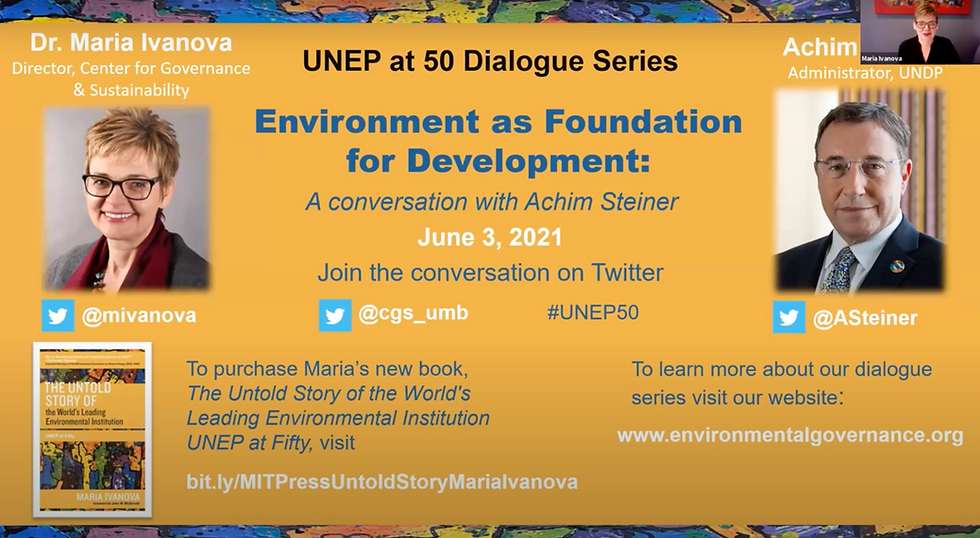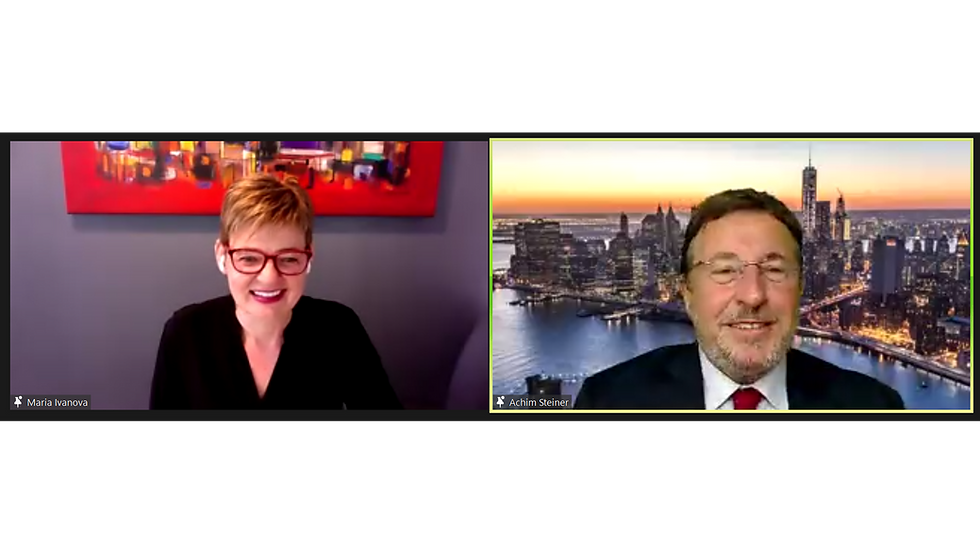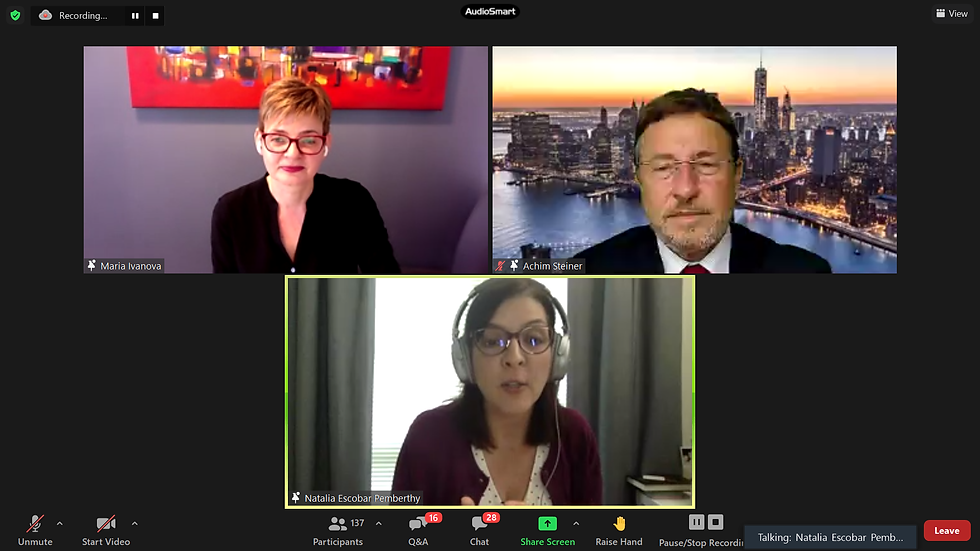Environment: The Foundation for Development
- shaunammurray
- Jun 10, 2021
- 4 min read

"We cannot live without the environment, but it can easily live without us"
- Achim Steiner
The Center for Governance and Sustainability's UNEP@50 Dialogue Series continued on June 3, 2021 through a dynamic conversation with Achim Steiner, Administrator of the UN Development Programme and former Executive Director of UNEP. Hosted by Center Director Maria Ivanova, the conversation delved into Steiner's own experience with UNEP and UNDP, his impression of the organizations, and a vision of the future where both organizations continue to play important roles. After a brief introduction from Dean Cash of the McCormack Graduate School, Ivanova and Steiner began the dialogue. Audience participation through the Q&A at the end of the webinar and pre-submitted questions made for an engaging discussion that was both insightful and personal.
Having led the United Nations Environment Programme from 2006 to 2016 and heading UNDP since 2017, after a brief stint at Oxford Martin School, Steiner is uniquely positioned to speak about each organization's role in the global institutional landscape. He articulated compellingly the ways that the challenges confronting humanity today are all interconnected. A self-described "child of Rio," Steiner traced the interrelated threads of his life and his career from his upbringing in Brazil through school and up until the Rio+20 UN conference on sustainable development in 2012, an event he sees as a turning point where a "new way of looking at the future was born or articulated, and we began to understand we cannot segment the future into sectors." This view, one informed by a variety of experiences both in and outside of the UN, shapes how Steiner views the challenges of our time.

When articulating his view of UNEP and the state of the organization when he joined in 2006, Steiner emphasized that the work being done at UNEP has, among other things, "combined the ability to bring science and knowledge into the mainstream and [prompt] decisions about life and society, and also be an advocate for the planet and people" at the same time. It is this unique blend of advocacy and expertise, Steiner feels, that sets UNEP apart and prepares the organization to tackle challenges of environmental governance. Professor Ivanova delved into Steiner's work at UNEP kickstarting the green economy initiative that has taken hold at the UN in a larger way, something Steiner sees as an example of the best that the United Nations has to offer. He stressed that the UN was never intended to function as an organization to strongarm states, but is “one that serves as a place to convene and a space to work in unison. The UN is a space for countries to learn from each other,” he noted. In Stenier’s view, the ability that UNEP has foster environmental knowledge at an organizational level is one of its most important characteristics, and is a capacity also highlighted in Ivanova’s book, The Untold Story of the World’s Leading Environmental Institution: UNEP at Fifty.
With her own leadership experience at the science-policy interface, Prof. Ivanova pressed Steiner on the most important dimensions for international organizations' leaders. He emphasized the need for "more eco and less ego” and noted how effective leaders put their mission above their image. "One person at the top can build a lot in the same way that someone at the top can also destroy a lot," Steiner explained and warned that “by allowing your own frustrations to drive decision making, you amplify the dysfunction." He noted the impactful efforts of the late UNEP deputy executive director Angela Cropper and her vision of the "triple helix" of economic, social, and environmental objectives. Steiner was also complimentary of current UNEP Executive Director Inger Andersen, noting how her path from UNDP to her current role mirrors his own journey and informs her skilled leadership of the Environmental Programme.

A dynamic portion of the webinar allowed audience members to submit questions for Q&A. During this time, Steiner spoke candidly about how COVID-19 has hampered efforts to achieve the UN Sustainable Development Goals and his vision for the upcoming Stockholm+50 conference. Steiner emphasized how amid all the tragedy of the COVID-19 pandemic, we have a once-in-a-lifetime opportunity to build back better and how the UN has a reinvigorated mission to improve the lives of those who have come to rely on the organization.
To end, Prof. Ivanova asked Steiner about his view of UNEP@100. He responded that he hoped the world would still have a United Nations, emphasizing that "we are a privileged generation to have the UN" and that all throughout history, periods without international cooperation have been marred by conflict and disaster. On UNEP specifically, Steiner hopes that the organization will continue to bring the frontier of environmental knowledge to people around the world and amplify calls for climate action.
With that, the Center for Governance and Sustainability concluded the second event in the UNEP@50 dialogue series. Please join us in September as we continue the conversations with Wanjira Mathai!

Comments